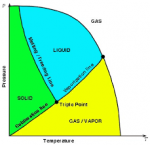. . who being the brightness of His glory and the express image of His person, and upholding all things by the word of His power, when He had by Himself purged our sins, sat down at the right hand of the Majesty on high
(Hebrews 1:3)
i heard an in-depth study of this Hebrews 1:3 once, in which the teacher went into the etymology & ancient use of the Greek word here translated as 'image' - χαρακτήρ, charaktér - saying it is a term associated with the work of an engraver or or other similar field of art, carrying the specific meaning of being an exact copy of a thing. it is like a print made from a block - the 'image' formed is in every way 100% identical to the block.
in mathematics an image is the set of output values that a function maps a subset of the domain to. a subset can be the entire domain - in which case, the associated image is the entirety of the range of the function. if the function is written f: A → B, then the image is B.
considering the case that Jesus Christ is called the "image" of the invisible Almighty God, the 'set' being mapped is the I AM. we know that the function in question is a bijection ((1:1 & onto)) by Colossians 1:19 -- "all the fullness of God" dwells in Him ((thus, 1:1)) and Hebrews 1:3, being an exact representation ((thus, onto)) -- therefore the inverse of the function exists, and the image of A is the entire set B. Colossians 1 then, by calling the Son the "image" of God, is calling Him exactly equal to God - distinguishable only in that His appearing is the result of a transformative mapping from the invisible to the visible.
why?
because Gideon, for just one example, spoke with I AM THAT I AM as though he were speaking with a man - one having the form of a son of man.
Now the Angel of the Lord came and sat under the terebinth tree which was in Ophrah
(Judges 6:11)
someone visible & appearing as one of the sons of men appeared and spoke with Gideon.
Then YHWH turned to him and said,
“Go in this might of yours, and you shall save Israel from the hand of the Midianites. Have I not sent you?”
(Judges 6:14)
that 'someone visible' having the appearance of a man, is none other than I AM THAT I AM the Eternal Father, the Invisible God whom no one has seen at any time.
so, 'why' is Christ the Image of the invisible God? because His name is called Immanuel, which, being translated, means 'YHWH with us'
Jesus Christ is I AM. God manifest in the flesh ((1 Timothy 2:6)) -- in order to redeem you to Himself, that we be one, even as He is One. to open the eyes of the blind.
Not God with us literally .
Why?
Mat 3:17 And lo a voice from heaven, saying, This is my beloved Son, in whom I am well pleased.
Joh 3:16 For God so loved the world, that he gave his only begotten Son, that whosoever believeth in him should not perish, but have everlasting life.
Joh 8:42 Jesus said unto them, If God were your Father, ye would love me: for I proceeded forth and came from God; neither came I of myself, but he sent me.
Joh 8:43 Why do ye not understand my speech? even because ye cannot hear my word.
Joh 16:28 I came forth from the Father, and am come into the world: again, I leave the world, and go to the Father.
Joh 16:29 His disciples said unto him, Lo, now speakest thou plainly, and speakest no proverb.
Joh 16:30 Now are we sure that thou knowest all things, and needest not that any man should ask thee: by this we believe that thou camest forth from God.
Joh 16:31 Jesus answered them, Do ye now believe?
--------------------------------------------
If Jesus is God then why did he not come in his own name and why is his doctrine not his own?
Joh 5:43 I am come in my Father's name, and ye receive me not: if another shall come in his own name, him ye will receive.
Joh 5:44 How can ye believe, which receive honour one of another, and seek not the honour that cometh from God only?
Joh 7:16 Jesus answered them, and said, My doctrine is not mine, but his that sent me.
Joh 7:17 If any man will do his will, he shall know of the doctrine, whether it be of God, or whether I speak of myself.
Joh 7:18 He that speaketh of himself seeketh his own glory: but he that seeketh his glory that sent him, the same is true, and no unrighteousness is in him.


1
